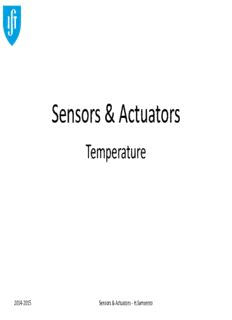
Sensors & Actuators PDF
Preview Sensors & Actuators
Sensors & Actuators Temperature 2014-2015 Sensors & Actuators -H.Sarmento Outline • Non-electric devices. • Contact: – RTD - Resistance temperature detectors. – Silicon resistive sensors – Thermistors. – Thermocouples. – Semiconductor pn junction. – Piezoelectric temperature sensors. • Non contact – Infrared thermometer. 2014-2015 Sensors & Actuators -H.Sarmento 1 Non-electric devices • Read visually, do not produce electrical signals. – Molecular change-of-state devices. – Fluid expansion devices. – Bimetallic devices. • Disadvantages: less accurate than electrical sensors, and temperature values not easily recorded. • Advantages: portability and independence from a power supply. 2014-2015 Sensors & Actuators -H.Sarmento 2 Molecular change-of-state devices • Devices whose appearance changes once a certain temperature is reached: labels, crayons, lacquers and liquid crystals. [Source: Omega] 2014-2015 Sensors & Actuators -H.Sarmento 3 Fluid expansion devices • the volume of a liquid or a gas changes as a function of temperature. [Source: Labon] [Source: Omega] 2014-2015 Sensors & Actuators -H.Sarmento 4 Bimetallic devices (1) • Two metals with dissimilar thermal expansion coefficients. • Manufactured in different forms for cooking, refrigerators and freezes, industrial applications. [Source: globalspec] 2014-2015 Sensors & Actuators -H.Sarmento 5 Bimetallic devices (2) • Two metals with similar moduli of elasticity and thicknesses. • The radius of curvature r changer with temperature. T 2 T 1 T T t 2 1 a a A B T T 1 2 2t T T 2 1 3r a a A B thermal expansion coefficients a ,a A B • Complex sensor: use of a displacement sensor to measure r. 2014-2015 Sensors & Actuators -H.Sarmento 6 Thermo resistive sensors (1) • RTD (Resistance Temperature Detector), silicon resistive sensors (KTY) and NTC (Negative Temperature Coefficients) thermistors. RTD: Metal (Pt) KTY: doped silicon NTC: doped ceramic 2014-2015 Sensors & Actuators -H.Sarmento 7 Thermo resistive sensors (2) • Power supply requirements: active (modulating). • Stimulus perception: contact. • Stimulus detection: absolute. • Complexity: direct sensor. • Type of stimulus: thermal. • Transduction principle: resistive. • Energy conversion: thermal electrical. 2014-2015 Sensors & Actuators -H.Sarmento 8 Resistance temperature detectors • Metallic: almost platinum (linear, predictable response, long- term stability, and durability) used, but also nickel, copper, tungsten (rare) and alloys. • Resistivity increases with temperature. RTD 2014-2015 Sensors & Actuators -H.Sarmento 9
Description: